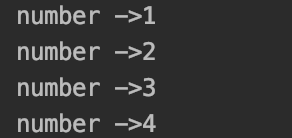Stream提供的distinct()方法只能去除重复的对象,无法根据指定的对象属性进行去重,可以应付简单场景。
private static void testDistinct() { int[] ints = {1, 1, 2, 2, 3, 3, 3, 4, 4, 4, 4}; Arrays.stream(ints).distinct().forEach(number -> { System.out.println("number ->" + number); }); }
结果如下:

有两种方式根据对象的属性进行去重,如下:
一、将对象的属性放入set再转为List(不建议)
List<Book> unique = books.stream().collect(collectingAndThen(toCollection(() -> new TreeSet<>(Comparator.comparing(o -> o.getId()))), ArrayList::new));
使用上述代码可以根据指定元素去重(book的id属性),原理是把id作为key放入set中,然后在转换为list。这种方式能够去重,但不优雅,因为需要执行流的终端操作,把流转换为List。这样的话,流就不能继续使用了,不优雅,不好。但网上大多是这种方法。所以第三种方法才是我们要推荐的。
二、使用自定义的distinctByKey方法去重(建议)
unique = books.stream().filter(distinctByKey(o -> o.getId())).collect(Collectors.toList());
这种方法是不是看着优雅多了?非常的java8了?是的。但这个distinctByKey()这个方法是自定义的。定义如下:
private static <T> Predicate<T> distinctByKey(Function<? super T, ?> keyExtractor) { Map<Object, Boolean> seen = new ConcurrentHashMap<>(); return t -> seen.putIfAbsent(keyExtractor.apply(t), Boolean.TRUE) == null; }
首先是filter方法,返回一个流,需要一个Predicate类型的参数(多嘴介绍下Predicate这个函数式接口,接受一个参数,返回布尔值)。
Stream<T> filter(Predicate<? super T> predicate)
filter根据Predicate返回的布尔值来判断是否要过滤掉,会过滤掉返回值为false的数据。而我们自己定义的distinctByKey返回值就是Predicate,所以可以作为参数传入filter。
distinctByKey也需要一个Function的参数。distinctByKey先是定义了一个线程安全的Map(相比于Hashtable以及Collections.synchronizedMap(),ConcurrentHashMap在线程安全的基础上提供了更好的写并发能力,但同时降低了对读一致性的要求),因为在流计算中是多线程处理的,需要线程安全。
然后将值作为key,TRUE作为value put到map中。这里的put方法使用的是putIfAbsent()。putIfAbsent()方法是如果key不存在则put如map中,并返回null。若key存在,则直接返回key所对应的value值。
其中putIfAbsent方法如下:
default V putIfAbsent(K key, V value) { V v = get(key); if (v == null) { v = put(key, value); } return v; }
所以
seen.putIfAbsent(keyExtractor.apply(t), Boolean.TRUE) == null;
这里用 == null判断是否存在于map了,若存在则返回false,不存在则为true。以用来达到去重的目的。
注:putIfAbsent()定义在Map接口中,是默认方法。
项目代码:
List<MaterialsTemplate> intelDrugStoreTemplateList = ExcelImportUtil.importExcel(file.getInputStream(), MaterialsTemplate.class, params); List<MaterialsTemplate> distinct = intelDrugStoreTemplateList.stream().filter(distinctByKey(MaterialsTemplate::getMmNo)).collect(Collectors.toList());